Finding the right marketing tools can feel overwhelming for a small business. You need powerful features without the enterprise price tag or a steep learning curve. The ideal marketing stack should automate tedious tasks, provide clear insights, and ultimately, drive growth. Juggling social media, email campaigns, search engine optimization (SEO), and paid ads requires a smart selection of software that works for you, not against you. This is especially true when running campaigns on platforms like Google or Meta Ads. To effectively manage your paid advertising budget and campaigns, a comprehensive guide to PPC management for small businesses is an invaluable resource.
This guide cuts through the noise. We have compiled and reviewed the 12 best marketing tools for small business, focusing on affordability, ease of use, and real-world impact. Our goal is to help solo creators, small business owners, and marketing managers build a powerful, budget-friendly marketing engine.
Inside this comprehensive resource list, you will find:
- Detailed breakdowns of each tool's core features and ideal use cases.
- Practical implementation tips to get you started quickly.
- An honest assessment of pros and cons based on real user experiences.
- Direct links and screenshots for every platform.
We will explore everything from all-in-one platforms like HubSpot to specialized solutions like Semrush and Canva. We'll also cover essential marketplaces such as the Shopify App Store and AppSumo for finding unique tools and deals. This curated list is designed to help you make informed decisions, so you can get back to what you do best: running your business.
1. PostOnce
Best For: Streamlining social media management and content distribution.
For small businesses where time is a scarce and valuable resource, PostOnce emerges as a powerful ally. It stands out as one of the best marketing tools for small business owners by directly tackling the challenge of maintaining a consistent and widespread social media presence. Its core function is a sophisticated "create once, distribute everywhere" model, allowing you to publish a single piece of content across more than a dozen networks, including Threads, Facebook, Instagram, LinkedIn, and X (formerly Twitter).
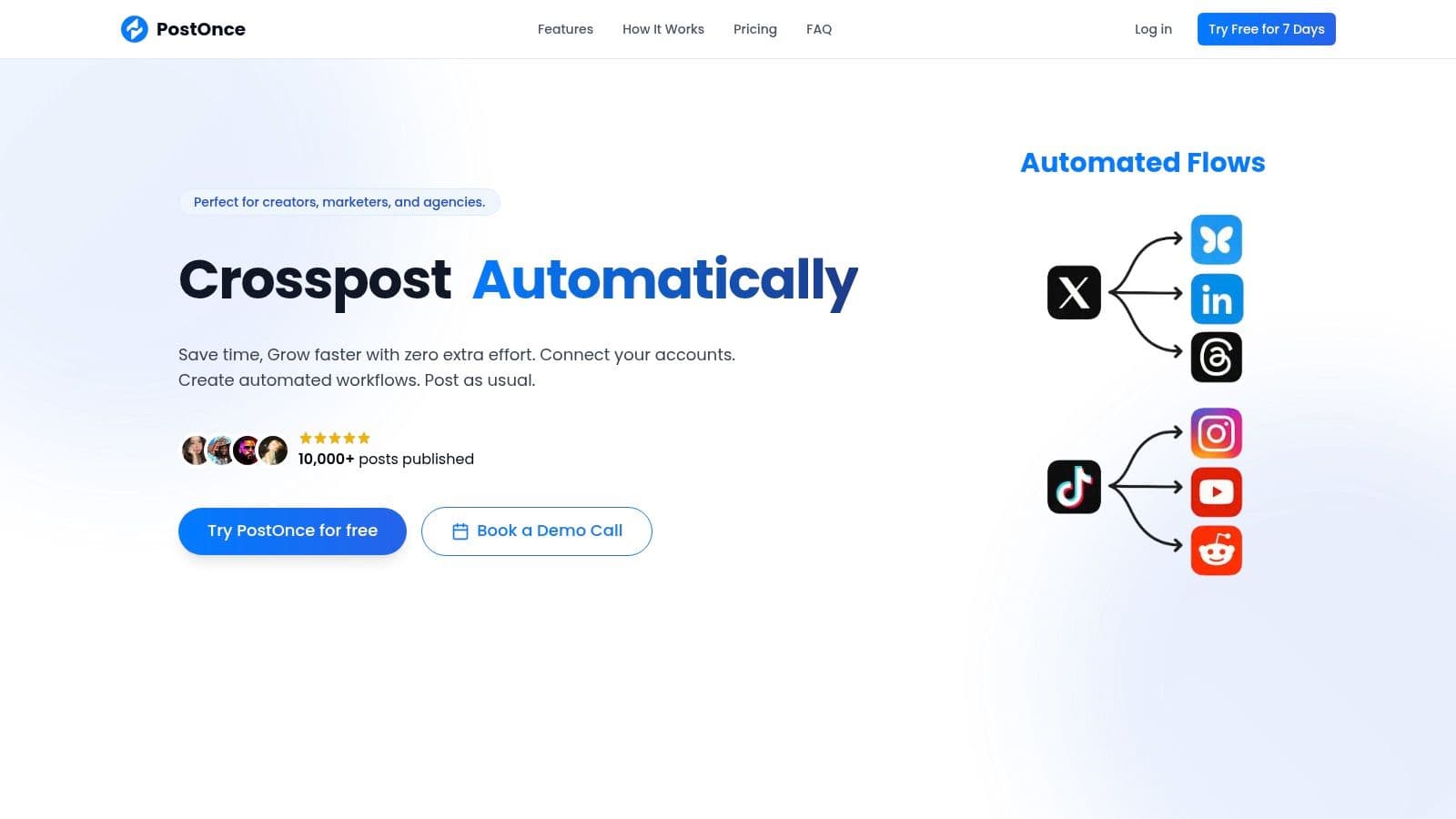
What truly sets PostOnce apart is its intelligent cross-posting technology. The platform automatically optimizes content for each network's specific requirements, adjusting text length, image dimensions, and even hashtag usage. This eliminates the tedious manual editing process, ensuring every post looks native and polished, a critical factor for audience engagement.
Key Features and Practical Applications
PostOnce is built for efficiency, making it an ideal tool for solo entrepreneurs, marketing managers, and small agencies.
- Smart Cross-Posting: The platform’s standout feature automatically reformats content for each social network. For example, a longer post intended for LinkedIn will be automatically truncated for X, while hashtags are optimized for Instagram, all without manual intervention.
- Multi-Account Management: Users can manage multiple brand profiles or client accounts from a single, intuitive dashboard. This is particularly beneficial for social media managers juggling several clients.
- One-Click Integration: Connecting your social accounts is seamless and secure, utilizing one-click OAuth integrations. This non-technical setup means you can be up and running in minutes, not hours.
Implementation Tip: Use the customizable workflows to create specific content distribution chains. For instance, you can set a rule to post professional announcements first to LinkedIn and X, followed by a more casual version to Facebook and Instagram an hour later.
Pricing and Access
PostOnce offers a transparent and scalable pricing structure, making it accessible for businesses at various growth stages. Plans start with the Starter tier at $9/month and go up to the Pro plan at $36/month for teams needing more advanced automation and support. A 7-day free trial is available, allowing you to test its full capabilities.
| Pros | Cons |
|---|---|
| Effortless, automated cross-posting with smart format optimization. | Full integration for video platforms like TikTok and YouTube Shorts is coming soon. |
| Simple setup and an intuitive interface require no technical expertise. | Advanced automation features are reserved for higher-priced plans. |
| Supports management of multiple accounts and allows unlimited posts. | |
| Transparent, affordable pricing with a free trial and refund policy. |
For any small business looking to maximize its social media reach without dedicating countless hours to manual posting, PostOnce provides a robust, user-friendly, and cost-effective solution.
Website: https://postonce.to
2. HubSpot Marketing Hub
HubSpot Marketing Hub is a true all-in-one platform designed to centralize and streamline your marketing efforts. For small businesses juggling multiple responsibilities, its key advantage is consolidating disparate tools like email marketing, CRM, social media scheduling, and ad management into a single, cohesive dashboard. This integration eliminates the data silos and manual work that often plague teams using several disconnected applications.
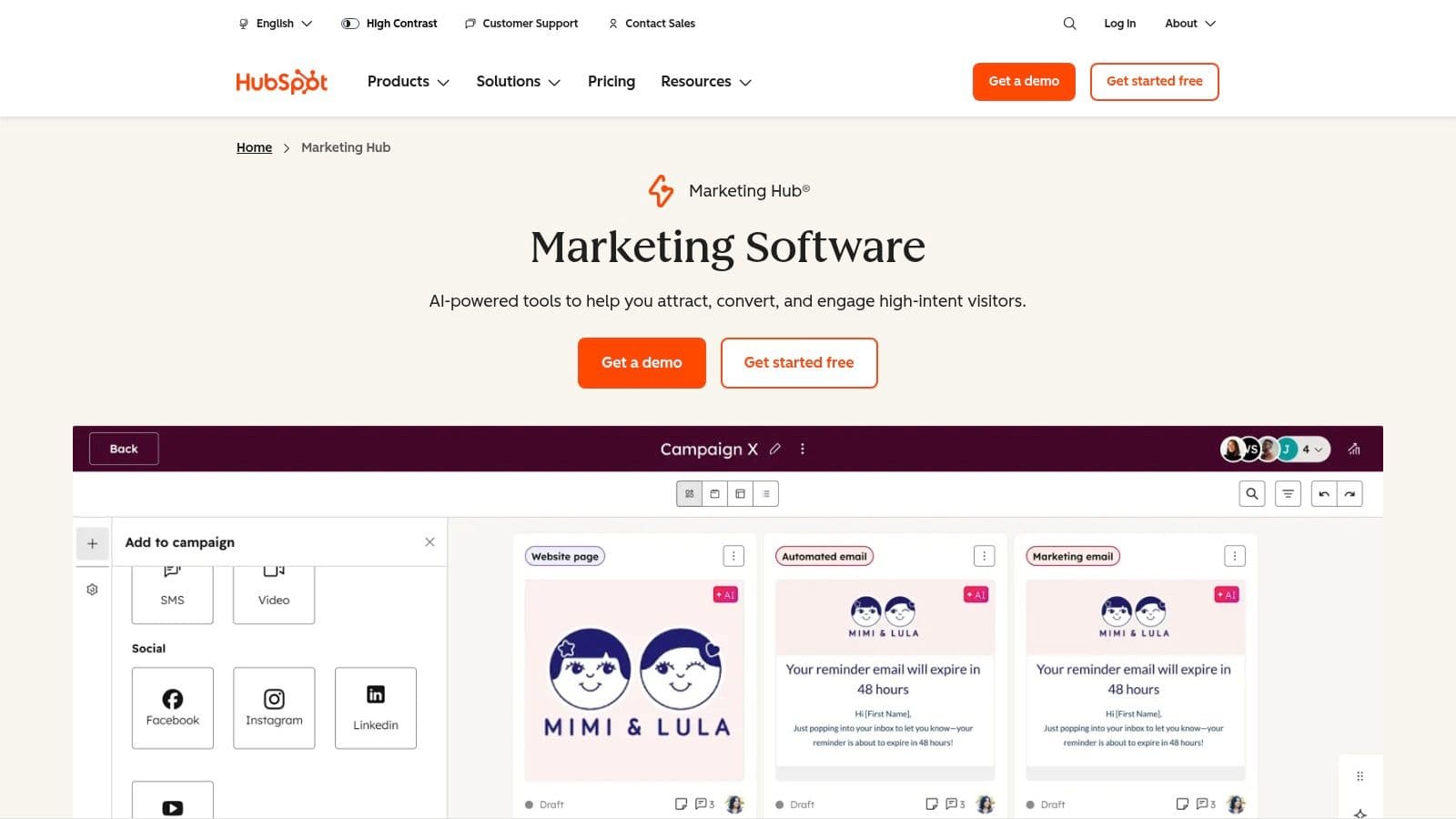
Unlike point solutions that only handle one task, HubSpot’s power lies in its built-in CRM. Every lead captured from a landing page, form, or ad is automatically stored as a contact with a detailed activity timeline. This allows for sophisticated segmentation and automation, enabling you to nurture leads with personalized content based on their specific interactions with your brand.
Key Features & Pricing
| Feature | Starter Tier ($18/mo) | Professional Tier ($800/mo) |
|---|---|---|
| Contacts | 1,000 Marketing Contacts | 2,000 Marketing Contacts |
| Automation | Simple automation | Omni-channel automation |
| Reporting | Standard reporting | Custom reporting & attribution |
| Support | Email & in-app chat | Phone & in-app chat |
Pros:
- Generous Free Tier: The free plan includes a powerful CRM and basic marketing tools, perfect for testing the ecosystem before committing.
- Scalability: The platform grows with your business, from simple email blasts to complex, multi-channel automated workflows.
- Extensive Education: HubSpot Academy offers free, high-quality courses and certifications on marketing, sales, and using their platform.
Cons:
- Onboarding Fees: The Professional and Enterprise tiers require a mandatory, one-time onboarding fee.
- Contact-Based Pricing: Costs can escalate quickly as your contact list grows.
HubSpot stands out as one of the best marketing tools for small business because it provides an enterprise-level foundation that is accessible even at the earliest stages.
Website: https://www.hubspot.com/products/marketing
3. Mailchimp
Mailchimp is one of the most recognizable names in email marketing, serving as an accessible entry point for small businesses looking to build their first email list. Its core strength lies in its user-friendly interface and vast library of professionally designed templates, which simplify the process of creating and sending visually appealing email campaigns. This focus on ease of use allows even those without technical skills to launch newsletters, promotions, and announcements quickly.
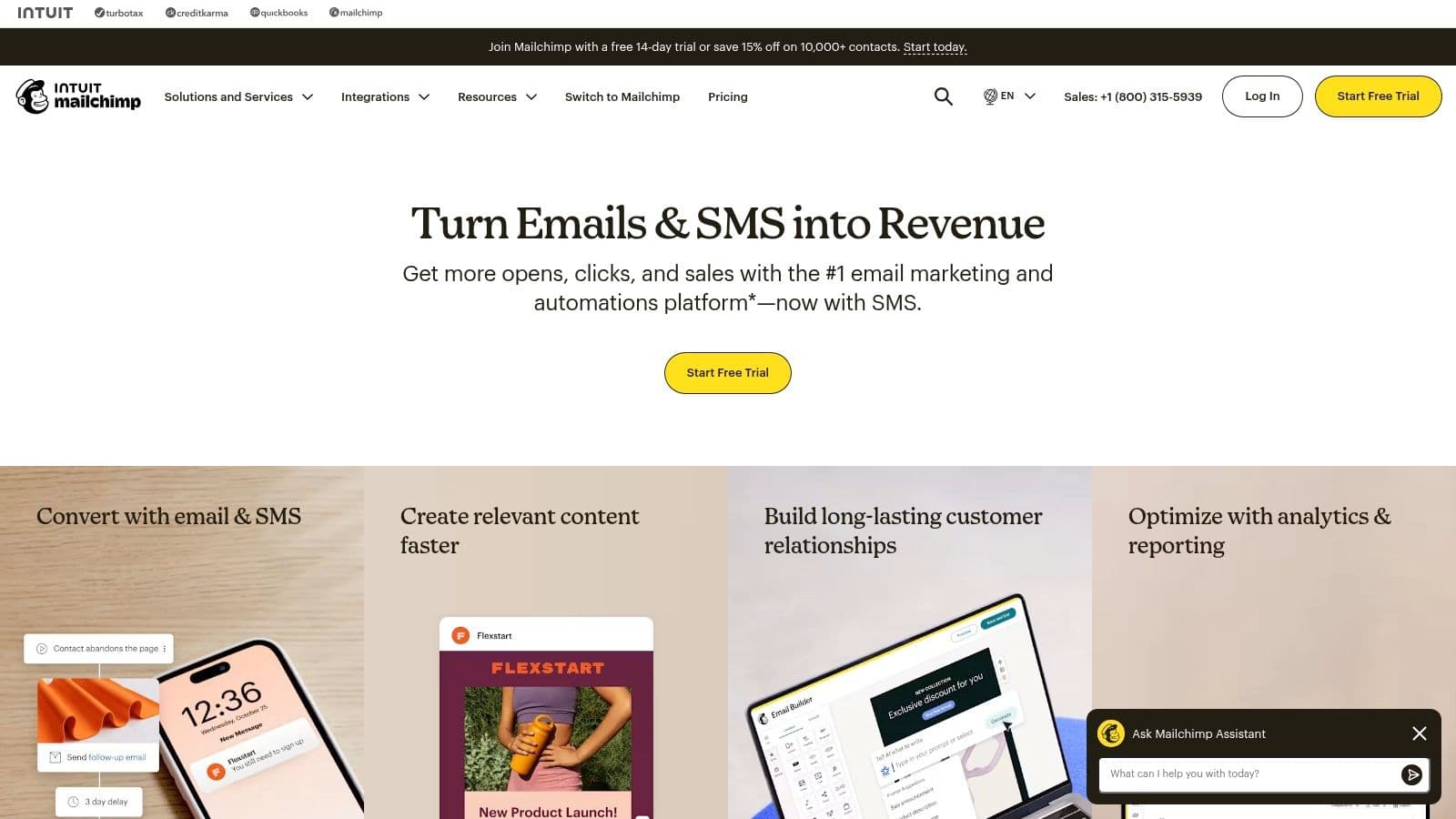
Unlike more complex all-in-one platforms, Mailchimp excels at its primary function: email. It provides robust tools for list management, segmentation, and basic automation, such as welcome emails for new subscribers. While it has expanded to include landing pages and a basic CRM, its main draw remains the polished and intuitive email-building experience that has made it a staple for millions of businesses worldwide.
Key Features & Pricing
| Feature | Free Tier ($0/mo) | Essentials Tier ($13/mo) |
|---|---|---|
| Contacts | 500 Contacts | Starts at 500 Contacts |
| Email Sends | 1,000 monthly sends | 5,000 monthly sends |
| Automation | Single-step automation | Multi-step journeys |
| Support | Email support for 30 days | 24/7 Email & Chat |
Pros:
- Intuitive Interface: The platform is famously easy to learn and use, making it ideal for beginners.
- Excellent Templates: A wide selection of high-quality, mobile-responsive email templates is available to get started quickly.
- Extensive Integrations: Mailchimp connects with hundreds of popular apps and e-commerce platforms like Shopify and WooCommerce.
Cons:
- Limited Free Plan: The free tier's contact and send limits are quite restrictive for growing businesses.
- Pricing Structure: Costs can increase significantly as your contact list grows, and advanced features are locked behind higher-tier plans.
Mailchimp is one of the best marketing tools for small business because it lowers the barrier to entry for professional email marketing, providing a reliable and straightforward solution.
Website: https://mailchimp.com
4. Canva
Canva is an indispensable visual communication platform that empowers small businesses to create professional-quality marketing assets without needing a graphic designer. Its core strength lies in making design accessible, offering a vast library of templates for everything from social media posts and email headers to print flyers and business presentations. For teams looking to maintain brand consistency across all channels, Canva’s Brand Kit feature is a game-changer, storing logos, color palettes, and fonts for easy access.

Unlike complex design software, Canva’s drag-and-drop interface is intuitive, allowing marketers to produce visuals quickly and efficiently. The platform integrates content creation with distribution through its built-in Content Planner, which lets you schedule completed designs directly to social media channels. This streamlines the entire workflow from concept to publication, saving valuable time for busy entrepreneurs.
Key Features & Pricing
| Feature | Free Tier ($0/mo) | Pro Tier ($14.99/mo for one person) | Teams Tier ($29.99/mo for first 5 people) |
|---|---|---|---|
| Templates | 250,000+ free templates | 610,000+ premium templates | All Pro features included |
| Brand Kit | 1 brand kit with 3 colors | 100 brand kits | 300 brand kits |
| AI Tools | Limited access | Magic Studio, Background Remover | Real-time collaboration & team features |
| Scheduling | N/A | Content Planner for 8 platforms | Team reports & insights |
Pros:
- Rapid Asset Creation: The template-driven approach allows for the quick creation of polished assets for multi-channel campaigns.
- Vast Media Library: Access to millions of stock photos, videos, and graphics reduces the need for external asset subscriptions.
- User-Friendly Interface: The platform is incredibly intuitive, making it easy for non-designers to get started immediately.
Cons:
- Plan Changes: Recent pricing changes to per-user models for teams can be confusing for existing and new customers.
- Template Overuse: Popular templates can be easily recognizable, potentially making a brand’s visuals look generic if not customized.
Canva is one of the best marketing tools for small business because it democratizes design, enabling anyone to produce stunning, on-brand visuals at scale.
Website: https://www.canva.com
5. Hootsuite
Hootsuite is a comprehensive social media management platform that allows small businesses to schedule, monitor, and analyze their social media presence from a single dashboard. Its main benefit for busy teams is centralizing content publishing across major networks like Instagram, Facebook, LinkedIn, and X (formerly Twitter), saving significant time compared to posting natively on each platform. This allows for a more strategic and consistent content calendar.
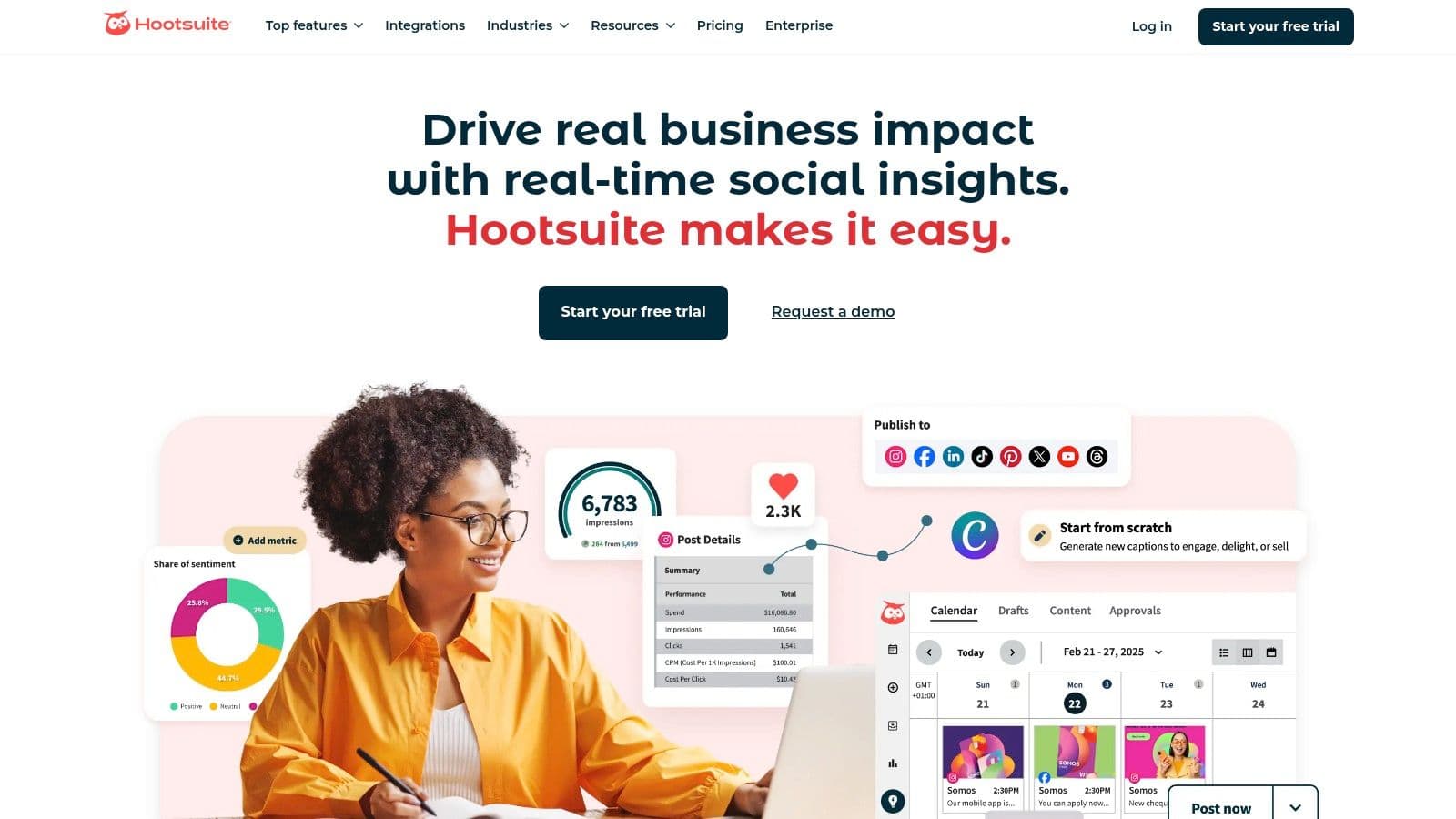
Unlike simpler schedulers, Hootsuite offers powerful monitoring and analytics features. You can create custom streams to track keywords, hashtags, and mentions, allowing you to engage with your audience in real-time and monitor brand sentiment. Its unified inbox consolidates direct messages and public comments, ensuring no customer interaction is missed. This makes it one of the more robust social media management solutions available. For a deeper dive, you can learn more about the best social media scheduling tools.
Key Features & Pricing
| Feature | Professional Tier ($99/mo) | Team Tier ($249/mo) |
|---|---|---|
| Social Accounts | 10 accounts | 20 accounts |
| Users | 1 user | 3 users |
| Scheduling | Unlimited posts, schedule in advance | All Professional features + team assignments |
| Analytics | Competitor benchmarking & reporting | All Professional features + custom analytics |
Pros:
- Mature Platform: A feature-rich and reliable suite that covers nearly every aspect of social media management.
- Powerful Analytics: Provides useful reporting and competitor insights that help refine your social strategy.
- All-in-One Dashboard: The ability to schedule, monitor, engage, and analyze from one place is a major time-saver.
Cons:
- High Price Point: Pricing can be relatively high for small businesses or solo entrepreneurs on a tight budget.
- Strict Plan Limits: The limits on users and social accounts often require upgrading to more expensive tiers as your team grows.
Hootsuite earns its spot as one of the best marketing tools for small business by offering a powerful, centralized command center for all social media activities.
Website: https://www.hootsuite.com
6. Semrush
Semrush is a comprehensive marketing toolkit designed to give small businesses a competitive edge in search engine results. Its primary strength is demystifying SEO and PPC by providing actionable data on keywords, competitor strategies, and backlink profiles. For a small business owner, this means you can uncover the exact terms your audience is searching for and analyze how your rivals are succeeding online.
Unlike simpler keyword tools, Semrush provides an entire ecosystem for visibility management. You can conduct a technical site audit to find and fix website errors, track your daily keyword ranking changes, and even discover content ideas based on what’s already performing well. This consolidation of SEO, content, and competitive intelligence tools into one platform saves time and provides a holistic view of your digital marketing performance.
Key Features & Pricing
| Feature | Pro Tier ($129.95/mo) | Guru Tier ($249.95/mo) |
|---|---|---|
| Projects | 5 | 15 |
| Keywords to Track | 500 | 1,500 |
| Pages to Crawl | 100,000 / month | 300,000 / month |
| Content Marketing Platform | No | Yes |
Pros:
- Deep Competitive Data: Unparalleled insights into competitor ad copy, organic keywords, and backlink sources.
- All-in-One Suite: Consolidates multiple core marketing tasks (SEO, PPC, social, content) into a single subscription.
- Powerful Site Audits: The technical audit tool is excellent for identifying issues that could be holding your site back in search results.
Cons:
- Steep Learning Curve: The sheer volume of data and tools can be overwhelming for beginners.
- Costly Add-ons: Features like local SEO listing management and additional users significantly increase the monthly price.
Semrush is one of the best marketing tools for small business because it levels the playing field, offering powerful intelligence that was once only accessible to large enterprises.
Website: https://www.semrush.com
7. Google Ads
Google Ads is an indispensable platform for small businesses aiming to capture high-intent customers at the exact moment they are searching for a solution. It allows you to place your business directly in front of users across Google Search, YouTube, and partner websites. For small businesses, its primary advantage is the ability to compete with larger players by targeting specific keywords and demographics, ensuring your budget is spent reaching the most relevant audience.
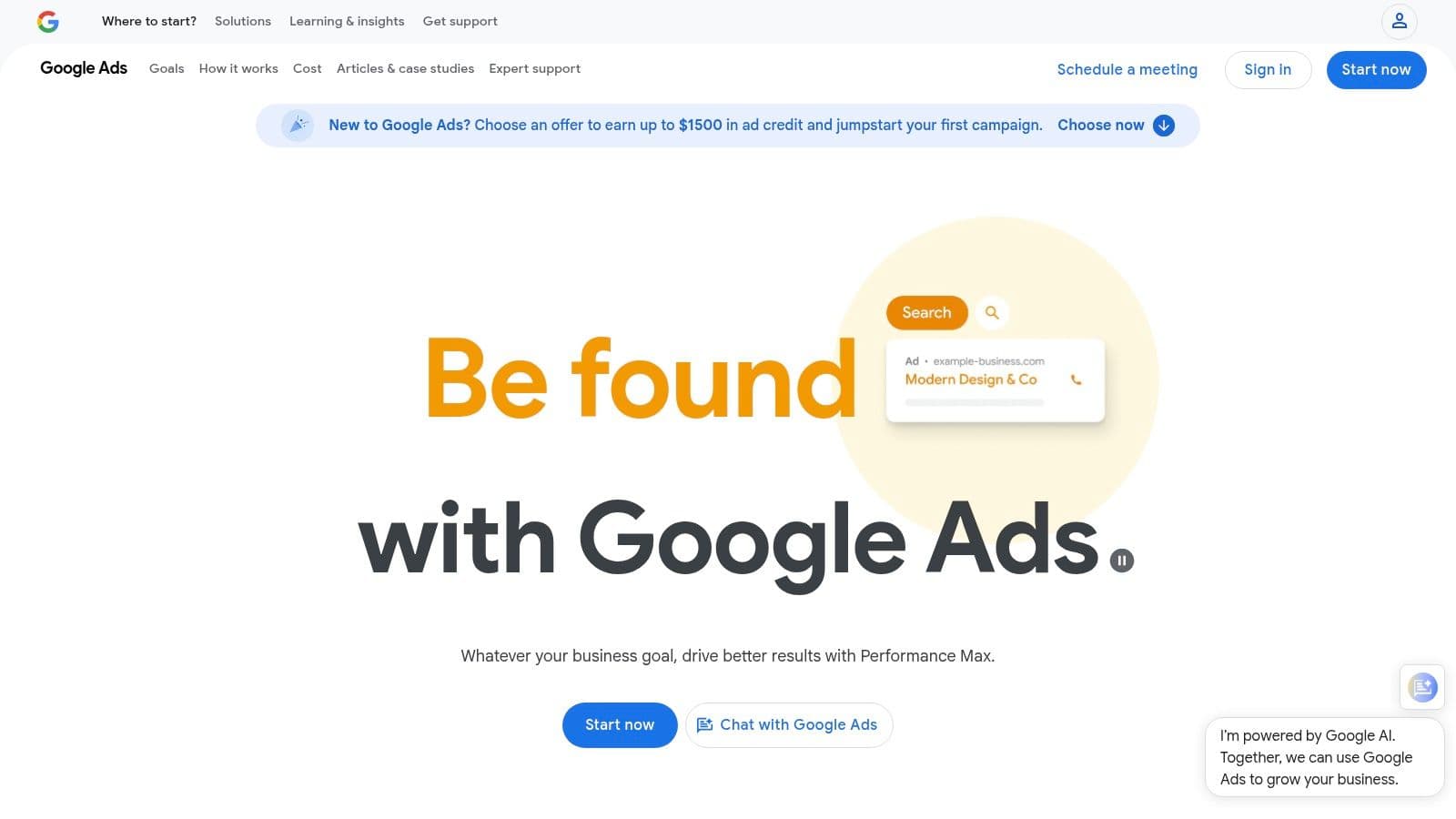
Unlike organic marketing which takes time to build momentum, Google Ads provides immediate visibility. You have complete control over your daily budget and bids, allowing you to scale your ad spend up or down based on performance. The platform’s robust analytics and tools like the Keyword Planner help you refine your strategy, identify new opportunities, and measure return on investment with precision.
Key Features & Pricing
| Feature | Details | Pricing Model |
|---|---|---|
| Campaign Types | Search, Display, Video, Shopping, Performance Max | Pay-per-click (PPC) or Pay-per-impression (CPM) |
| Budget Control | Set your own daily budget and maximum bids | Flexible; no minimum spend required |
| Targeting | Keywords, location, demographics, audience interests | Varies based on keyword competition and targeting |
| Analytics | Built-in performance reporting & conversion tracking | Free to use with an active ad account |
Pros:
- Unmatched Reach: Tap into Google's massive network to connect with billions of potential customers.
- High-Intent Traffic: Attract users who are actively searching for your products or services, leading to higher conversion rates.
- Budget Flexibility: Start with a small budget and scale as you see results, making it accessible for any business size.
Cons:
- Steep Learning Curve: Effectively managing campaigns to maximize ROI and avoid wasted spend requires knowledge and time.
- Competitive Costs: Popular keywords can be expensive, driving up the cost-per-click significantly.
Google Ads is one of the best marketing tools for small business because it offers a direct and powerful way to drive qualified traffic and generate leads from day one.
Website: https://ads.google.com
8. Meta Ads (Facebook & Instagram)
Meta Ads is the quintessential advertising platform for reaching audiences on Facebook, Instagram, Messenger, and the Audience Network. For small businesses, particularly those in B2C or local markets, its power lies in unparalleled audience granularity. You can move beyond basic demographics to target users based on interests, online behaviors, life events, and engagement with your business, making it highly effective for both brand awareness and direct-response campaigns.
Unlike search-based advertising where you capture existing demand, Meta Ads excels at creating it. Through visually compelling formats like video, Reels, and carousels, you can tell your brand story and engage users who weren't actively looking for your product. The platform’s Lookalike Audiences feature is a game-changer, allowing you to find new customers who share characteristics with your best existing ones, automating audience expansion with remarkable accuracy.
Key Features & Pricing
| Feature | Description | Pricing Model |
|---|---|---|
| Audience Targeting | Granular options including demographics, interests, behaviors, and custom audiences (e.g., website visitors). | Pay-per-result (e.g., per click, impression, or conversion). No minimum spend. |
| Ad Formats | Supports image, video, carousel, collection, and lead generation forms across multiple placements. | Cost varies based on audience competition, ad quality, and campaign objective. |
| Reporting | Ads Manager provides in-depth analytics on reach, engagement, cost-per-result, and conversions. | Included with ad spend. Detailed reporting and receipt management are built-in. |
| Billing | Flexible billing options with daily or lifetime budgets, and charge thresholds or monthly invoicing. | You control your budget and only pay up to the amount you set. |
Pros:
- Massive Reach: Access billions of daily active users across the world's largest social media platforms.
- Granular Targeting: Highly specific audience-building capabilities allow for efficient ad spend and higher relevance.
- Powerful Retargeting: The Meta Pixel enables sophisticated campaigns to re-engage website visitors and past customers.
Cons:
- Performance Volatility: Ad costs and results can fluctuate significantly due to algorithm changes and seasonality.
- Evolving Policies: Advertisers must constantly adapt to frequently updated ad policies to avoid disapprovals.
Meta Ads remains one of the best marketing tools for small business because it provides a direct line to a massive, engaged consumer base with targeting options no other platform can match.
Website: https://www.facebook.com/business/ads
9. Shopify App Store – Marketing Category
For e-commerce small businesses, the Shopify App Store’s Marketing category isn't a single tool but an entire ecosystem of specialized solutions. Its primary advantage is providing thousands of apps designed to integrate seamlessly with a Shopify store, allowing merchants to build a custom marketing stack without complex coding. This approach lets you plug specific functionalities, like advanced pop-ups, SMS marketing, or loyalty programs, directly into your existing e-commerce foundation.

Unlike all-in-one platforms, the Shopify App Store empowers you to pick and choose best-in-class tools for each marketing function. You can find highly-rated apps for email marketing, abandoned cart recovery, SEO optimization, and customer reviews, often with one-click installation. User reviews and "Built for Shopify" badges help vet quality, ensuring the apps work natively with your product, customer, and order data for powerful personalization.
Key Features & Pricing
| Feature | Details | Pricing Model |
|---|---|---|
| Direct Integration | One-click installs, native data syncing | Varies by App (Free, Freemium, Subscription) |
| App Diversity | Email, SMS, SEO, Reviews, Pop-ups, Loyalty, Ads | Billed through your Shopify account |
| Vetting System | User reviews, developer support ratings | Often tiered based on usage or store traffic |
| First-Party Tools | Includes Shopify Email, Shopify Flow, etc. | Included in Shopify plan or has usage costs |
Pros:
- Seamless Integration: Apps are built specifically for Shopify, ensuring they work with your store's data right out of the box.
- Unmatched Variety: Find a tool for nearly any marketing niche or budget, from free starter apps to enterprise-level solutions.
- Build a Custom Stack: Only pay for the exact functionality you need instead of a bloated all-in-one platform.
Cons:
- Subscription Overload: Costs can add up quickly as you subscribe to multiple apps for different functions.
- Overwhelming Choice: The sheer number of apps can make it difficult to find the best one for your specific needs.
The Shopify App Store is one of the best marketing tools for small business e-commerce owners because it provides unparalleled flexibility to enhance a store’s marketing capabilities.
Website: https://apps.shopify.com/categories/marketing-and-conversion-marketing
10. Zapier
Zapier is the digital duct tape that connects your marketing stack, automating workflows between apps that don't natively integrate. For small businesses, its power lies in eliminating tedious, manual data entry tasks. Instead of exporting a CSV from your lead form to upload to your CRM, or manually posting new blog updates to social media, Zapier creates automated "Zaps" that do the work for you, freeing up valuable time.
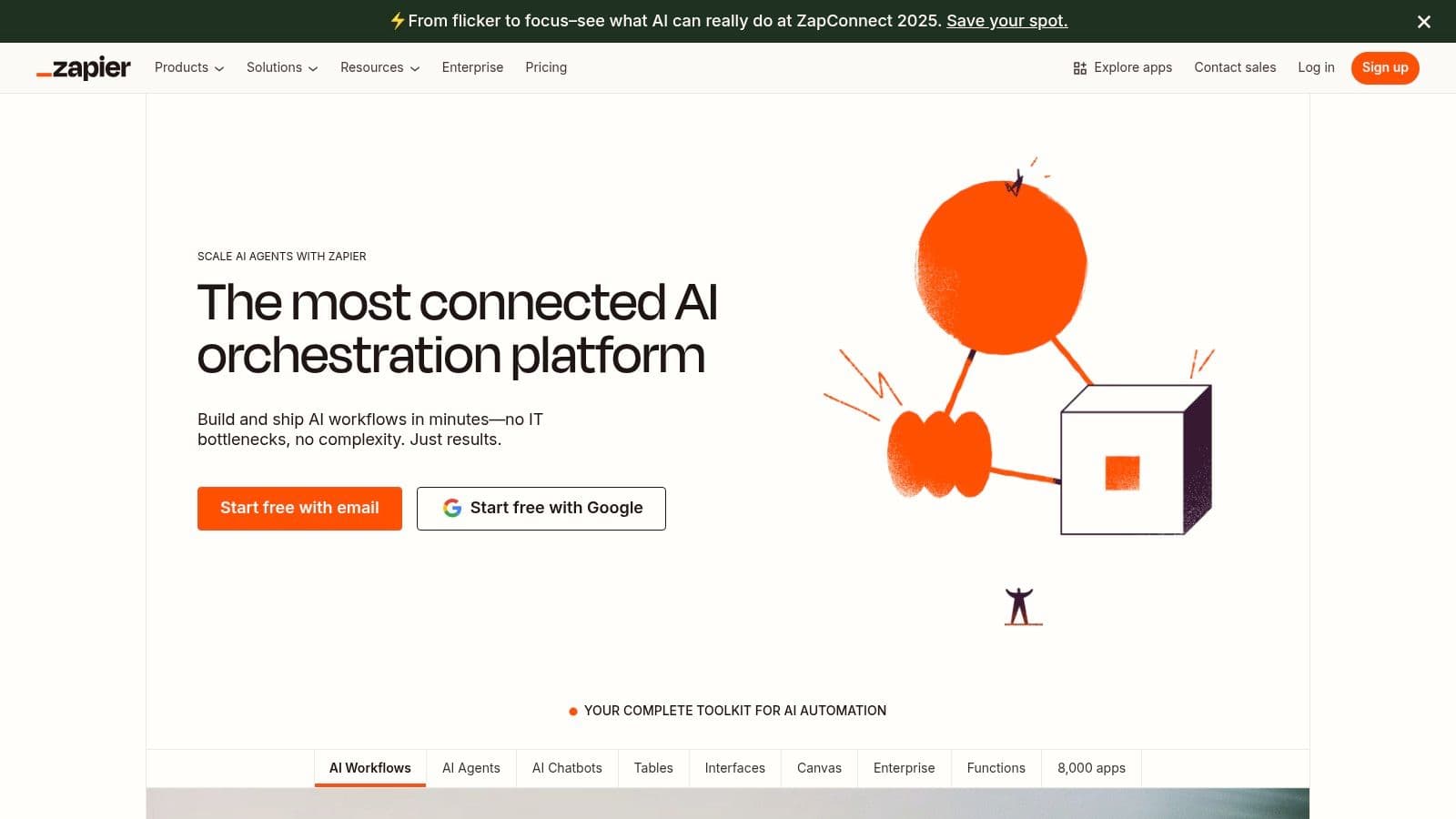
Unlike single-purpose tools, Zapier acts as a universal translator for over 6,000 applications. A practical example for a small business could be a Zap that triggers when a customer makes a purchase on Shopify, automatically adding them to a specific Mailchimp audience, creating a new customer record in QuickBooks, and sending a Slack notification to the team. This level of cross-platform integration is what makes it one of the best marketing tools for small business owners looking to maximize efficiency. To dive deeper into its capabilities, you can explore more on small business marketing automation.
Key Features & Pricing
| Feature | Free Tier ($0/mo) | Starter Tier ($19.99/mo) |
|---|---|---|
| Tasks/Month | 100 tasks | 750 tasks |
| Zaps | 5 Single-step Zaps | 20 Multi-step Zaps |
| Update Time | 15 minutes | 15 minutes |
| Premium Apps | Not available | 3 Premium app connections |
Pros:
- Massive App Library: Connects virtually any marketing tool you use, from social media platforms to CRMs and analytics software.
- No-Code Simplicity: Its intuitive, trigger-and-action editor makes it easy to build powerful automations without writing a single line of code.
- Scalable Workflows: Start with simple, two-step Zaps and build up to complex, multi-step workflows with conditional logic as your needs grow.
Cons:
- Task-Based Pricing: Costs can increase quickly if you run high-volume automations, as each action in a Zap consumes a task.
- Feature Gating: Key features like conditional logic, instant triggers, and premium app connectors are reserved for paid plans.
Zapier earns its spot by enabling small businesses to create a seamlessly integrated marketing ecosystem, saving countless hours and reducing human error.
Website: https://zapier.com
11. AppSumo (Deals Marketplace)
AppSumo isn't a single tool but a dynamic marketplace that offers lifetime deals (LTDs) on emerging software. For small businesses operating on a tight budget, it provides an unparalleled opportunity to access a wide array of marketing applications, from SEO analyzers to social media schedulers, for a one-time, deeply discounted price. This model allows you to build a powerful marketing stack without committing to recurring monthly subscriptions.
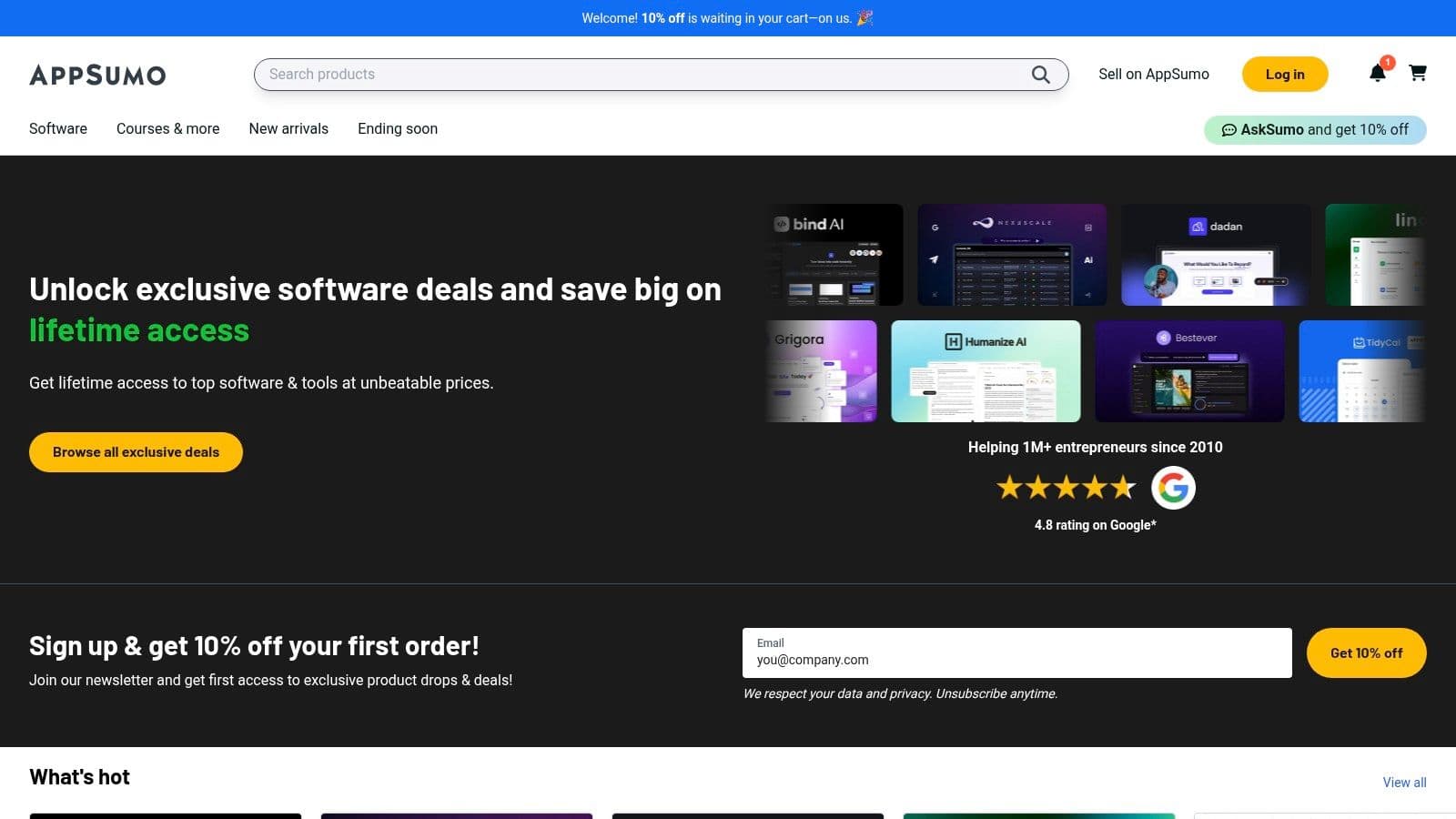
Unlike traditional software stores, AppSumo's inventory is constantly rotating with limited-time offers. The platform's value lies in the discovery of innovative, up-and-coming tools that might otherwise be unknown. The active community reviews and Q&A sections are crucial, offering real-world feedback and insights from other business owners that help vet the quality and long-term potential of each deal before you purchase.
Key Features & Pricing
| Feature | Standard Deals (One-Time Cost) | Plus Membership ($99/yr) |
|---|---|---|
| Deal Access | Access to all current deals | 10% off all purchases |
| Early Access | Standard access | Exclusive early and late access to deals |
| Community | Full access to reviews & Q&A | Access to "The Sauce" private community |
| Support | Standard support & 60-day refund window | Extended support options |
Pros:
- Cost-Effective: The lifetime deal model provides significant long-term savings compared to monthly SaaS subscriptions.
- Tool Discovery: It's an excellent way to discover and experiment with new and innovative marketing tools without major financial risk.
- Community Vetting: User reviews and active discussions provide transparent, unfiltered feedback on a tool's performance and the vendor's reliability.
Cons:
- Vendor Longevity Risk: Some startups featured may not survive long-term, potentially rendering the lifetime deal obsolete.
- Varying Quality: The quality and support level can be inconsistent from one deal to the next.
AppSumo is one of the best marketing tools for small business because it democratizes access to software, enabling bootstrapped companies to build a competitive tech stack affordably.
Website: https://appsumo.com
12. Capterra
Capterra isn't a marketing tool itself but rather an indispensable research platform for finding the right software. For a small business owner, the process of comparing dozens of tools for email marketing, CRM, or social media can be overwhelming. Capterra simplifies this by acting as a comprehensive directory, providing detailed feature lists, verified user reviews, and direct comparison data in one place.
Unlike vendor websites that only highlight their strengths, Capterra offers a more balanced perspective through crowdsourced user reviews. You can filter options based on your specific needs, such as pricing model, user rating, or essential features, allowing you to create a personalized shortlist. This pre-purchase diligence helps you avoid costly mistakes and select a tool that truly fits your business workflow and budget.
Key Features & Pricing
| Feature | Details | Cost |
|---|---|---|
| Software Categories | Access to 900+ categories (CRM, Email, etc.) | Free to Use |
| Verified User Reviews | Tens of thousands of reviews from real users | Free to Use |
| Comparison Tools | Side-by-side comparisons of up to four products | Free to Use |
| Shortlists & Reports | Curated reports on top-performing software | Free to Use |
Pros:
- Massive Review Database: The high volume of genuine user reviews provides invaluable insights into a tool's real-world performance.
- Broad Market Coverage: It covers nearly every software category imaginable, making it a one-stop-shop for research.
- Powerful Filtering: The ability to filter by features, deployment, and business size helps narrow down choices efficiently.
Cons:
- Sponsored Listings: Top-of-page results are often paid placements, so it's wise to scroll down for organic results.
- No Direct Purchase: It’s a directory that links out to vendors, not a reseller, adding an extra step to the buying process.
Capterra earns its spot as one of the best marketing tools for small business because it empowers you to make smarter, more informed purchasing decisions from the very start.
Website: https://www.capterra.com
Top 12 Marketing Tools Feature Comparison
| Product | Core Features/Characteristics | User Experience & Quality | Value Proposition | Target Audience | Price Points |
|---|---|---|---|---|---|
| PostOnce 🏆 | Smart cross-posting, format optimization, multi-account support✨ | Easy setup, intuitive, reliable ★★★★ | Save time, consistent branding💰 | Solo creators, SMBs, agencies 👥 | $9–$36/mo, scalable plans 💰 |
| HubSpot Marketing Hub | Email, automation, CRM, ads, analytics, 1800+ integrations | Scalable, strong education ★★★ | All-in-one marketing suite | SMBs to enterprises 👥 | Tiered, contact-based pricing 💰 |
| Mailchimp | Email campaigns, automations, templates, basic CRM | User-friendly, template-rich ★★★ | Entry-level email marketing | SMBs, new marketers 👥 | Free & paid tiers, contact-based 💰 |
| Canva | Drag-drop editor, brand kits, AI asset creation, scheduling | Fast design, large template lib ★★★ | Design + scheduling combo | SMBs, marketers, teams 👥 | Free & Pro plans, per user 💰 |
| Hootsuite | Scheduling, monitoring, inbox, analytics, competitor insights | Mature, feature-rich ★★★★ | Centralized social media management | SMBs, teams 👥 | Mid-high pricing 💰 |
| Semrush | SEO, PPC, site audit, keyword & competitor analysis | Deep data, complex tools ★★★ | All-in-one search & marketing data | SMBs, agencies 👥 | Subscription + add-ons 💰 |
| Google Ads | Paid search/display/YouTube campaigns, budget control | Flexible budgets, ROI focus ★★★ | Access to high-intent traffic | SMBs, advertisers 👥 | Pay per click/cost varies 💰 |
| Meta Ads (Facebook & Instagram) | Flexible billing, detailed reporting, multiple campaign types | Large reach, visual focus ★★★ | Extensive targeting & formats | SMBs, local businesses 👥 | Variable spend 💰 |
| Shopify App Store – Marketing | Marketing app marketplace, Shopify-native integrations | Wide app choice, easy install ★★★ | Customizable Shopify marketing stack | SMB e-commerce 👥 | Varies by app 💰 |
| Zapier | No-code multi-step workflows, thousands of app connectors | Scales simple to complex ★★★ | Automate marketing tools | SMBs, marketers 👥 | Free trial, paid tiers per task 💰 |
| AppSumo (Deals Marketplace) | Discounted/lifetime marketing app deals | Good deals, variety ★★★ | Affordable try-before-you-buy | SMBs, bargain hunters 👥 | Low entry, deal-dependent 💰 |
| Capterra | Software directory, user reviews, shortlists | Broad coverage, trusted reviews ★★★ | Helps choose best marketing tools | Buyers, decision makers 👥 | Free |
Activate Your Growth Engine With the Right Tools
Navigating the vast landscape of digital marketing can feel overwhelming, especially for a small business owner juggling multiple roles. However, as this comprehensive guide has demonstrated, you don't need a Fortune 500 budget or a sprawling marketing department to achieve significant results. The power lies in strategic selection and intelligent implementation of the right tools for your unique business needs.
We've explored a dozen powerful platforms, from the all-encompassing CRM and marketing automation of HubSpot to the creative powerhouse of Canva and the indispensable SEO insights of Semrush. Each tool serves a distinct purpose, designed to solve a specific marketing challenge you face every day. The key takeaway is that technology is your greatest ally in leveling the playing field. These platforms are built to automate repetitive tasks, provide critical data for better decision-making, and amplify your message across multiple channels, freeing up your most valuable resource: your time.
From Information to Implementation: Your Next Steps
The goal is not to adopt every tool on this list overnight. That approach leads to subscription fatigue and underutilized software. Instead, the path to building a powerful, cost-effective marketing stack is methodical and intentional. Start by performing a simple audit of your current marketing efforts.
- Identify Your Biggest Bottleneck: Where are you spending the most time for the least return? Is it creating social media content? Managing email lists? Understanding your website traffic?
- Pinpoint Your Primary Goal: Are you focused on lead generation, brand awareness, customer retention, or e-commerce sales? Your primary objective will dictate your first tool choice.
- Align with Your Budget: Many of the best marketing tools for small business, like Mailchimp and HubSpot, offer robust free tiers. Start there. You can always scale up to a paid plan as your business grows and your needs become more sophisticated.
Choosing the right tool is only half the battle; successful implementation is what drives growth. Don't just sign up and hope for the best. Dedicate time to learn the platform. Most of these services offer extensive knowledge bases, free webinars, and tutorials. Integrate the tool deeply into your daily workflow. For example, if you choose a social media scheduler like PostOnce or Hootsuite, block out time each week specifically for content planning and scheduling. This consistency is what transforms a simple tool into a true growth engine.
Building Your Custom Marketing Stack
Think of your marketing tools as building blocks. You start with a foundational piece and add complementary ones over time.
- For the Content-Focused Solopreneur: Your stack might start with Canva for visuals, Semrush for SEO and topic ideas, and a powerful scheduler to distribute your content.
- For the E-commerce Shop Owner: Shopify is your core, but you'll supercharge it with apps for email marketing (like Mailchimp), social proof, and Meta Ads for targeted customer acquisition.
- For the Service-Based Business: HubSpot's free CRM could be your starting point to manage client relationships, paired with Google Ads to capture high-intent local search traffic.
The beauty of the modern marketing ecosystem, powered by integrators like Zapier, is that these tools don't have to operate in silos. You can connect your email platform to your CRM and your social scheduler to your content creation tools, creating a seamless, automated workflow that works for you even when you're not. This interconnected system is the ultimate goal, turning disparate activities into a cohesive and measurable marketing strategy. The journey begins with one smart choice.
Ready to conquer your biggest marketing bottleneck? If social media management is eating up your valuable time, start with PostOnce. It's designed specifically for small businesses and creators to schedule content across all major platforms from one simple dashboard, saving you hours every week. Take control of your social media today with PostOnce.